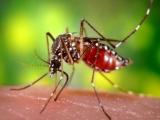Florida health officials said today that the investigation into four Zika infections in people without histories of travel to affected areas has determined they were likely contracted from local mosquitoes, making them the first such cases in the continental United States.
The Florida Department of Health (Florida Health) said in a statement today that active transmission is occurring in a 1-square-mile area of Miami-Dade County, just north of downtown Miami.
At a Centers for Disease Control and Prevention (CDC) telebriefing today, Director Tom Frieden, MD, MPH, said the area, called Wynwood, is a popular restaurant and entertainment district and some of the patients were exposed to the virus at their workplaces.
"As we anticipated, Zika is now here," he said.
Patients were sick in early July
Investigations suggest the patients contracted Zika in early July, became ill about a week later, and then were tested. Frieden said state officials immediately launched an aggressive mosquito control response, going door-to-door with trucks and backpack spraying that targets both adult and larval mosquitoes.
Florida Health believes two of the four cases were isolated incidents and that the other two are likely related, Sarah Revell, the department's media and marketing manager, told CIDRAP News. Three of the patients are men and one is a woman, and health officials aren't able to confirm or deny her pregnancy status.
The department's outreach and sampling in the affected area is still under way, and it's possible that more local cases could be identified, she said.
Though the CDC wouldn't be surprised to see more individual local Zika cases or other clusters in the United States this summer, additional cases from the small area where local transmission occurred in Miami would be a concern, Frieden said.
When questioned if outlining a small affected area might underplay a wider mosquito threat, Frieden noted that mosquitoes that carry Zika rarely travel more than 150 meters from where they hatch, making the battle against a cluster of local illnesses a very focal one. In contrast, mosquitoes that carry West Nile virus travel over a much wider area.
Florida health officials did the right thing by outlining the affected area so that people can help remove mosquito breeding sites and for transparency, he said. While no travel restrictions to the affected neighborhood have been recommended, doctors in the area will be doing more Zika testing in pregnant women.
OneBlood, the company that provides blood services throughout Florida and other parts of the southeast, said today that it would immediately start testing donated blood for Zika virus. It had originally announced that screening with in investigational test would begin on Aug 1. Earlier this week, the Food and Drug Administration asked blood establishments in the two affected counties to stop collecting blood until they could screen each unit for Zika RNA.
Waging a yard-by-yard battle
Michael Osterholm, PhD, MPH, director of the University of Minnesota's Center for Infectious Disease Research and Policy (CIDRAP), publisher of CIDRAP News, said Florida's developments are playing out as experts predicted and that the experience offers a real learning opportunity for public health, showing the importance of rapid case detection and immediate application of mosquito control steps.
Because Aedes mosquitoes that carry Zika don't fly far from where they're hatched, rarely even crossing city roads, they lend themselves to substantial reduction when health officials canvas the area to eliminate breeding sites, he said. Aerial spraying likely plays a limited role, because it doesn't penetrate the areas where Aedes mosquitoes live, he said. Instead, going yard-by-yard and lot-by-lot to eliminate standing water and treat sites that collect water are more powerful tools, he added.
Osterholm said that, because of such a localized mosquito pattern, Florida health officials don't have to detect a lot of human cases to know that the Zika virus is circulating in a location. "You don't need 100 fire towers to tell you where a forest fire is."
What could complicate the picture is if human cases are reported from multiple sites, he said.
Reactions to latest developments
The White House said today that confirmation of the nation's first known Zika cases is a wake-up call for lawmakers who went on summer break without passing a funding package requested by President Barack Obama, Politico reported, citing White House deputy press secretary Eric Schultz, who addressed reporters at a briefing today.
Sen Marco Rubio, R-Fla., released a statement today saying the development is disturbing, but not surprising. He said the nation is entering a critical phase of the crisis. "We must act quickly to prevent the problem from reaching a tipping point in the mainland US as it already has in Puerto Rico," he said.
He urged the Obama Administration to use all the existing tools it has to reprogram existing public health funding toward the Zika fight. "As I have said time and time again, both parties in Congress need to get it together and approve funding to combat the Zika virus," Rubio said.
March of Dimes President Edward McCabe, MD, PhD, said in a statement today, "This is the news we've been dreading."
He said it's only a matter of time until microcephaly cases due to local transmission of Zika in the continental United States occur, and he urged members of Congress to be ready to send bipartisan legislation to the President's desk immediately when they return in September.
See also:
Jul 29 Florida Health statement
Jul 29 CDC press release
Jul 29 Politico story
Jul 29 Marco Rubio statement
Jul 29 March of Dimes statement





















